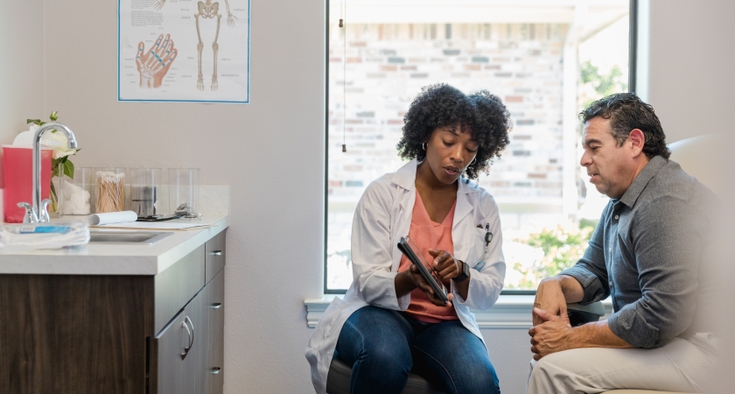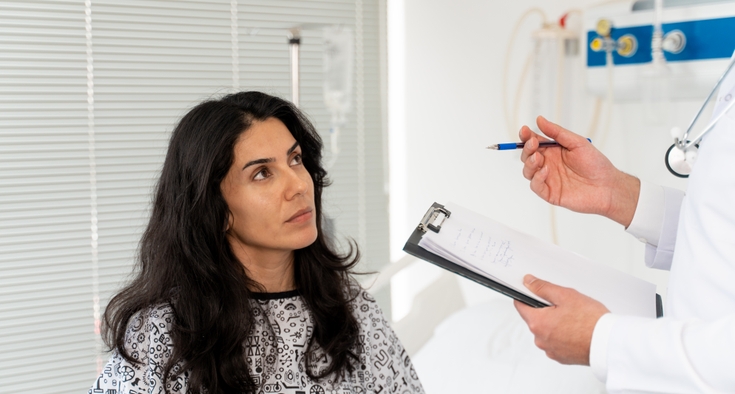The University of North Carolina’s first Society of Urologic Oncology fellow now practices at Novant Health, where his fluency in Spanish and his skills in advanced treatment put genitourinary cancer patients at ease.
“Spanish is very handy here in North Carolina, which means I can take better care of patients who don’t speak English,” said Ibardo Zambrano, MD, who emigrated from Colombia at 16 and learned English in high school. He has treated genitourinary cancers at Novant Health Urology - Wilmington and Brunswick Forest since last year.
“It helps build trust with my patients,” Dr. Zambrano, 40, said.
Just 5% of U.S. urologists are of Hispanic descent. Dr. Zambrano said patients who are not fluent in English often struggle to book appointments, which can mean delays in diagnosing.
Clear communication is key during these sensitive moments, Dr. Zambrano said. He works to help minimize cancer recurrence to the prostate, testicles, bladder and kidneys. With no language barrier to confuse a patient, Dr. Zambrano is able to describe in detail the available treatment options in a comfortable environment.
Conditions Dr. Zambrano and our other urology physicians regularly treat include:
- Urinary difficulties
- Incontinence
- Pain while urinating
- Erectile dysfunction
- Blood in urine
- Frequent urinary tract infections
- Overactive bladder
- Prostate cancer
- Bladder cancer
- Kidney cancer
- Testicular cancer
- Kidney stones
Using robotics during procedures
Robotic surgery got its start about 25 years ago and was initially intended to allow surgeons to operate remotely in a battlefield situation. But the technology was quickly adapted to enhance minimally invasive surgery across urology and other surgical specialties. Robotic platforms are now widely used around the world, including at Novant Health New Hanover Regional Medical Center.
The word “robot” can be misleading, these are highly sophisticated devices operated by intensively trained surgeons. A typical robotic platform is equipped with four interactive arms operated by a surgeon using a remote console. It delivers high-performance visuals and precise instrumentation through small incisions.
Dr. Zambrano said robotic approaches decrease bleeding, risk of infection, pain and scarring compared to traditional open surgery. “It also makes everything faster with recovery,” Dr. Zambrano said. “That’s the idea behind doing things with robotics.”
Urologists at Novant Health New Hanover Regional Medical Center are able to perform surgery for patients using robotics and treat a wide range of benign and oncological diseases of the genitourinary tract using the latest technology available.
Knowing when to screen
Prostate cancer is the most common cancer and the second-leading cause of death among men in the U.S. Prostate-specific antigen (PSA) levels in the blood are used to screen men, but this has become a much-debated subject. Years ago, primary care physicians reached the consensus that PSA screening was resulting in over-diagnosis and over-treatment. As a result, rates of PSA screening decreased, leading to a rise in prostate cancer diagnoses, especially those in advanced stages.
“If there is a strong family history of prostate cancer, patients should begin screening early – in their 40s. The point is to catch prostate cancer early when it is treatable and cure rates are higher,” Dr. Zambrano said. “Nowadays, we have additional tests to help determine cancer aggressiveness and help guide treatment decisions.”
Medical guidelines advise men to have regular conversations with their doctors. “Knowing your patient’s family history, specifically cancer history, helps make screening decisions,” Dr. Zambrano said.
Partnerships and trials are on the way
In October, Novant Health Zimmer Cancer Institute will open a multidisciplinary genitourinary oncology clinic to improve healthcare delivery and strengthen clinical collaborations among specialists at Novant Health treating all genitourinary cancers. Dr. Zambrano plans to continue to grow the research partnership with UNC to improve the way surgeons communicate the risks and benefits of operations and treatment to patients.
“This will ultimately help a patient and their doctor make the right decisions around surgery,” he said. “Being a surgeon, you see patients early and that’s very rewarding. As a urologist, I am with them all through their journey.”
Make a referral to one of our Urologists:
Coastal: 910-667-7746
Charlotte: 704-633-9441
Winston-Salem: 336-245-2100





